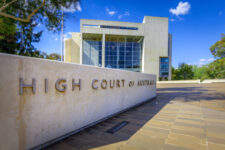Former High Court Justice Dyson Heydon: No Stranger to Controversy

Former High Court Justice Dyson Heydon AC is facing allegations of sexual harassment from six of his former associates, after a High Court Inquiry found the claims of the women to be substantiated.
Mr Heydon, who sat on the High Court from 2003 to 2013, has had a controversial career due in part to his outspoken criticism of “judicial activism” – which is the idea that judges should go beyond the letter of the law and consider the broader implications of their decisions – as well as his post-bench role heading up the 2014 Royal Commission into Trade Union Governance and Corruption.
The former justice has vehemently denied the allegations made against him and, despite the inquiry’s findings, it is important to bear in mind he is innocent of the allegations until and unless it is proven otherwise in a court of law.
The Black Letter Loner
Dyson Heydon, now 77 years old, was admitted to the NSW Bar in 1973 at the age of 30, having spent his younger years as a Rhodes Scholar obtaining a Master of Arts and Bachelor of Civil Law from Oxford University.
At the age of 34, he was elected Dean of the University of Sydney Law School publishing a number of legal texts on commercial law and evidence.
He took silk in 1987 after eight years at the bar, and was eventually sworn in as a judge of the NSW Court of Appeal and Supreme Court in 2000.
As a judge, Heydon strongly advocated for a “black-letter” judicial approach where judges act with restraint in interpreting and applying the law, preferring literal interpretation over deciphering the “spirit of the law”.
His concern over broad interpretation was based on a belief that it would result in inconsistent and arbitrary decisions contrary to the rule of law.
In an infamous 2003 speech against “judicial activism” Heydon remarked:
“[Judicial activism] means serving some function other than what is necessary for the decision of the particular dispute between the parties. Often the illegitimate function is the furthering of some political, moral or social programme: the law is seen not as the touchstone by which the case in hand is to be decided, but as a possible starting point or catalyst for developing a new system to solve a range of other cases.”
Heydon’s outspoken criticism of “activist judges” was received positively by the Howard government, and John Howard appointed him to the High Court shortly thereafter.
Whilst on the High Court, former Justice Heydon frequently found himself at odds with his colleagues on the bench, gaining the moniker “The Great Dissenter” by commentators.
Heydon dissented in many high-profile cases, including Plaintiff M70 case, which shut down the Gillard government’s proposed Malaysian Solution, as well as the “Plain Packaging Case” which looked into the constitutionality of Tobacco Plain Packaging Act 2011 (Cth).
Heydon retired from the High Court in 2013.
Conflicted Commissioner
Soon after leaving the bench, Heydon found himself in a controversial position as the head of the 2014 Royal Commission into Trade Union Governance and Corruption.
The Royal Commission was instituted by the Abbot Government following a number of high-profile cases of financial malfeasance within unions, particularly the Australian Workers Union. However, it was viewed by some commentators as being politically motivated by anti-union ideologues.
In August 2015, then Commissioner Heydon provoked calls for his recusal after accepting an invitation to deliver a law lecture at a Liberal Party fundraiser organised by party affiliated lawyers.
This led to a number of unions putting forward applications that Heydon step down due to “apprehended bias”, claims which were ultimately rejected by the Commission.
The union inquiry was completed in 2015 and its subsequent report proved relatively inconsequential.
Current Sexual Harassment Allegations
On Monday 22 June 2020, a High Court Inquiry found that Heydon sexually harassed six young female judges’ associates whilst on the bench.
Subsequently, a number of further allegations have been made by former ACT Law Society president Noor Blumer and a University of Canberra student, citing inappropriate behaviour.
Three of the former associates are currently seeking compensation for what they say they experienced. There are also calls to strip Mr Heydon of his Order of Australia honour.
The Chief Justice of Australia, Susan Kiefel, had the following to say about the allegations:
“The findings are of extreme concern to me, my fellow Justices, our Chief Executive and the staff of the Court. We’re ashamed that this could have happened at the High Court of Australia.”
“We have made a sincere apology to the six women whose complaints were borne out. We know it would have been difficult to come forward. Their accounts of their experiences at the time have been believed. I have appreciated the opportunity to talk with a number of the women about their experiences and to apologise to them in person. I have also valued their insights and suggestions for change that they have shared with the Court.”







